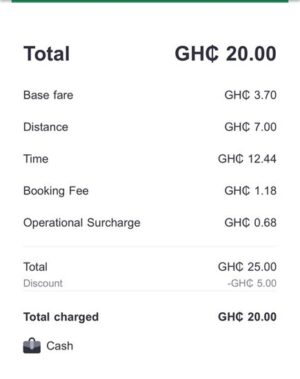…as ride-hailers express dissatisfaction
Users of ride-hailing app Bolt have raised concerns over the introduction of an extra layer of cost in the form of a five percent ‘booking fee’ otherwise referred to as ‘digital transport fee’ on every requested ride, despite warning from the Driver and Vehicle Licensing Authority (DVLA) banning its implementation earlier this year in April.
Analysis of receipts from a significant number of completed trips on the app showed that Bolt was still flouting the directive from the sector regulator that banned online transport operators from charging the illegal fee.
It was further established that although the proposed digital transport fee was pegged at a flat rate of GH¢1, riders on the Bolt app pay about five percent extra on their actual cost per trip.

For instance, a rider whose trip fee was GH¢53.79 was surcharged an extra GH¢2.67 in booking fee, instead of the GH¢1 flat fee—a charge which the DVLA has cautioned online transport operators against.
The DVLA, which regulates the ride-hailing sub-sector, in April this year, issued a circular back-tracking its earlier decision on the proposed digital transport fee, following harsh reactions and concerns from the public regarding its implementation.
The statement hinted at further deliberations with the Transport Ministry on the way forward to ensure that any new introductions were done with stakeholder input.
But although there has been no subsequent communication to that effect, Bolt now charges five percent on the cost of every ride as ‘booking fee’.
Some users of the app, mostly students and workers, who were interviewed on the issue expressed their concerns over the illegal fees which they say have increased the amount of money they spend on essential commuting.
“I think it’s not right for Bolt to go against the directive from the industry regulator to charge users a so-called booking fee. Already, I spend so much on transport and the addition of these new costs only makes things worse,” an aggrieved user on the app said.
Another Bolt user shared: “These new fees are just unfortunate because it will make the online transport business in Ghana more expensive and unattractive. I don’t understand why Bolt will start charging a fee that has not been approved yet, and even take more than the proposed amount.”
Majority of persons who were interviewed identified Bolt amongst the digital transport apps with the highest charge rate per trip. They appealed to the industry policy makers and regulators to intervene and check these unlawful fees being charged. This they believe will deter other ride-hailing apps from following suit.
Bolt flouts DVLA directive as it introduces 5% ‘booking fee’ on rides
…as ride-hailers express dissatisfaction
Users of ride-hailing app Bolt have raised concerns over the introduction of an extra layer of cost in the form of a five percent ‘booking fee’ otherwise referred to as ‘digital transport fee’ on every requested ride, despite warning from the Driver and Vehicle Licensing Authority (DVLA) banning its implementation earlier this year in April.
Analysis of receipts from a significant number of completed trips on the app showed that Bolt was still flouting the directive from the sector regulator that banned online transport operators from charging the illegal fee.
It was further established that although the proposed digital transport fee was pegged at a flat rate of GH¢1, riders on the Bolt app pay about five percent extra on their actual cost per trip.
For instance, a rider whose trip fee was GH¢53.79 was surcharged an extra GH¢2.67 in booking fee, instead of the GH¢1 flat fee—a charge which the DVLA has cautioned online transport operators against.
The DVLA, which regulates the ride-hailing sub-sector, in April this year, issued a circular back-tracking its earlier decision on the proposed digital transport fee, following harsh reactions and concerns from the public regarding its implementation.
The statement hinted at further deliberations with the Transport Ministry on the way forward to ensure that any new introductions were done with stakeholder input.
But although there has been no subsequent communication to that effect, Bolt now charges five percent on the cost of every ride as ‘booking fee’.
Some users of the app, mostly students and workers, who were interviewed on the issue expressed their concerns over the illegal fees which they say have increased the amount of money they spend on essential commuting.
“I think it’s not right for Bolt to go against the directive from the industry regulator to charge users a so-called booking fee. Already, I spend so much on transport and the addition of these new costs only makes things worse,” an aggrieved user on the app said.
Another Bolt user shared: “These new fees are just unfortunate because it will make the online transport business in Ghana more expensive and unattractive. I don’t understand why Bolt will start charging a fee that has not been approved yet, and even take more than the proposed amount.”
Majority of persons who were interviewed identified Bolt amongst the digital transport apps with the highest charge rate per trip. They appealed to the industry policy makers and regulators to intervene and check these unlawful fees being charged. This they believe will deter other ride-hailing apps from following suit.











